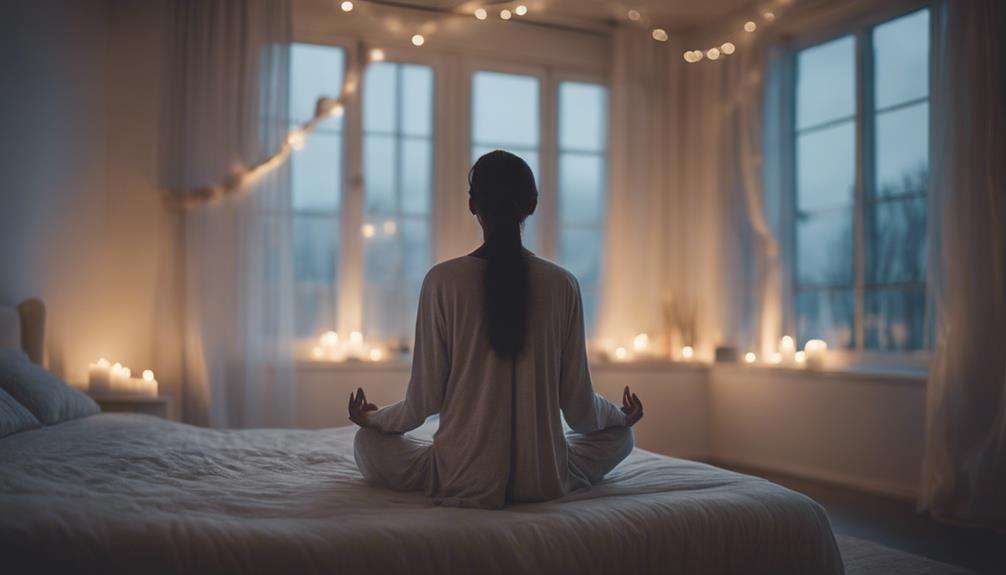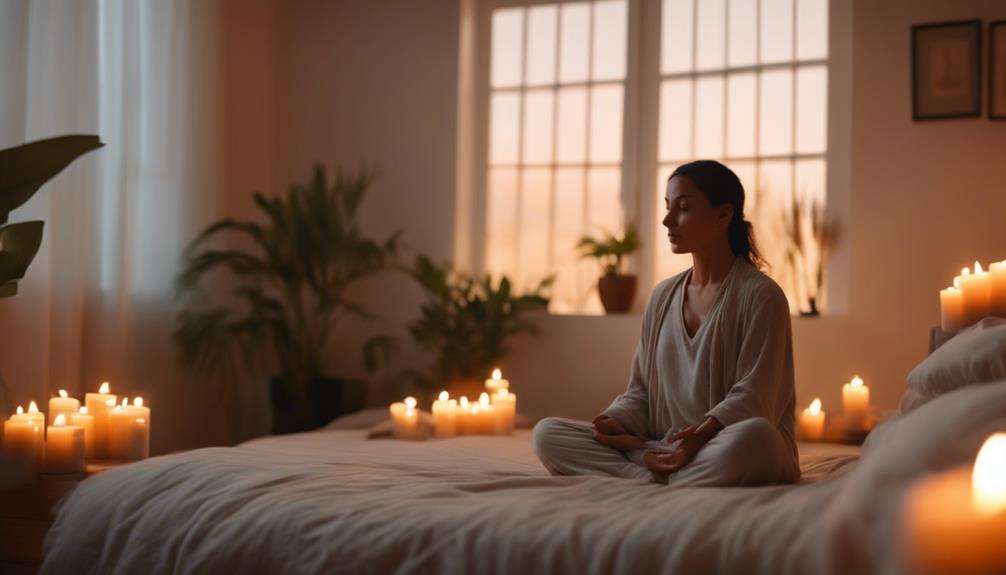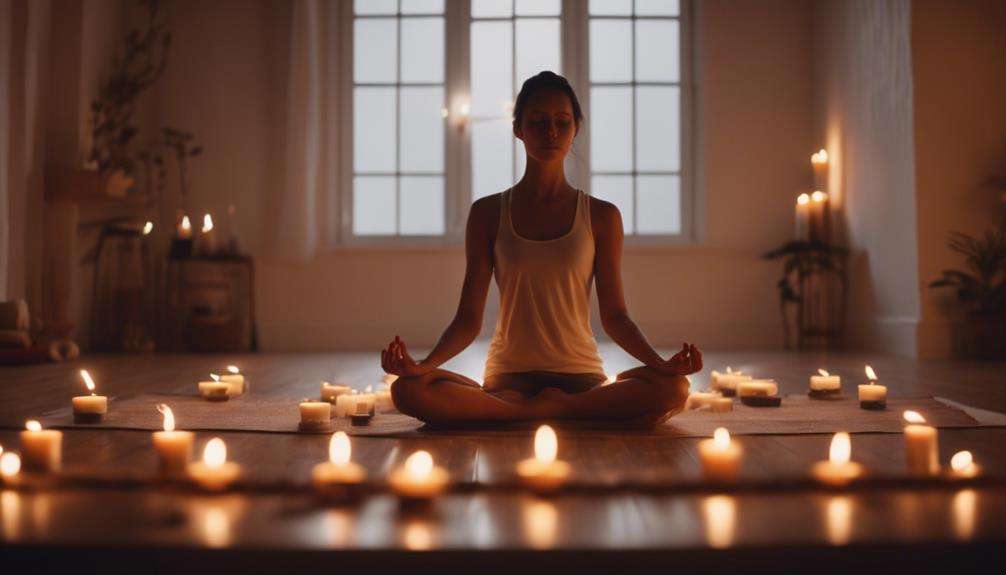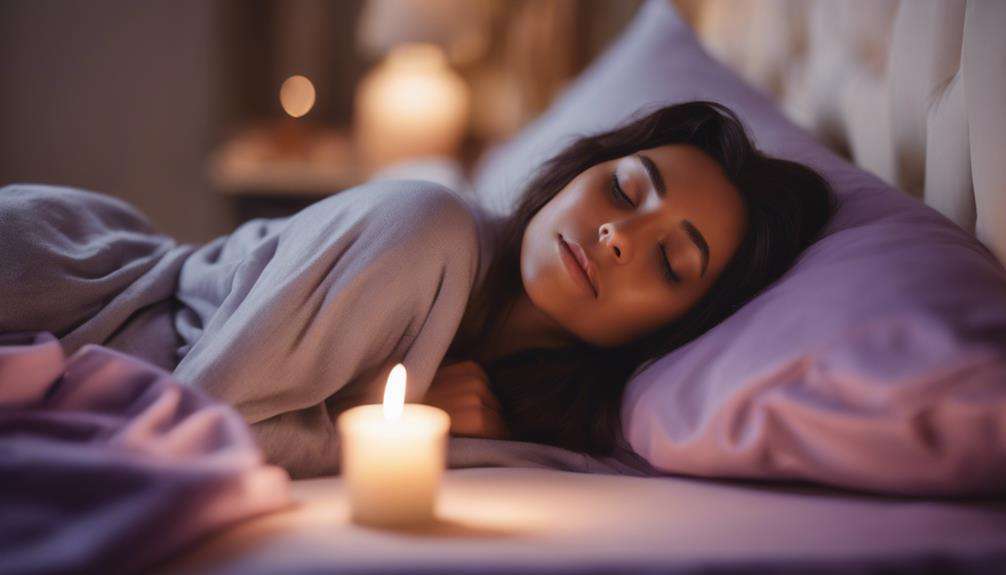If you've been struggling to get a good night's sleep, incorporating meditation techniques into your routine could be the solution you've been looking for.
Imagine being able to calm your mind, relax your body, and drift off into a deep slumber effortlessly. By exploring various meditation practices tailored to enhance sleep quality, you might just discover the key to unlocking a more restful and rejuvenating night's rest.
So, why not give it a try and see how meditation can transform your sleep experience?
Key Takeaways
- Body scan and mindful breathing techniques promote deep relaxation for improved sleep quality.
- Diaphragmatic and rhythmic breathing aid in reducing anxiety and preparing the body for rest.
- Mindful sleep preparation and creating a sleep-inducing environment enhance bedtime routines for better rest.
- Meditation assists in calming the mind, regulating breathing, and managing stress for restful sleep.
Benefits of Meditation for Better Sleep
Discover how incorporating meditation into your daily routine can significantly enhance the quality of your sleep and reduce daytime impairment. Meditation, including body scan meditation and mindfulness meditation, offers a range of benefits for improving sleep quality.
Body scan meditation, which focuses on physical sensations and releasing tension, promotes relaxation, making it easier to drift off to sleep. For those struggling with insomnia or sleep disturbances, incorporating mindfulness meditation can help calm the mind and create a more peaceful state conducive to restful sleep.
Research has shown that mindfulness meditation is a key component of cognitive behavioral therapy for insomnia, providing cognitive and emotional benefits that positively impact sleep patterns. By practicing meditation regularly, you can learn to self-regulate breathing and manage anxiety, both of which are crucial for combating sleep issues.
These techniques not only help you fall asleep faster but also improve the overall quality of your sleep, leading to more energy and alertness during the day.
Techniques to Enhance Sleep Quality
If you're looking to enhance your sleep quality, focusing on your breathing can help you relax and prepare for rest.
The body scan method increases awareness of physical sensations, aiding in relaxation to potentially improve your sleep.
Engaging in mindful sleep preparation techniques can set a calming tone for bedtime and encourage a restful night.
Breathing for Relaxation
To enhance the quality of your sleep, incorporating deep breathing techniques before bedtime can effectively relax your body and mind. Here are some techniques to help you improve your sleep through breathing:
- Practice diaphragmatic breathing to lower heart rate and reduce anxiety.
- Engage in slow, rhythmic breathing to activate the body's relaxation response.
- Try the 4-7-8 technique by inhaling for 4 seconds, holding for 7, and exhaling for 8 to promote relaxation.
- Use mindful breathing to calm the nervous system, quiet racing thoughts, and create a peaceful environment for restful sleep.
These techniques can assist you in preparing your body and mind for a night of rejuvenating sleep.
Body Scan Method
Enhance the quality of your sleep by incorporating the Body Scan Meditation technique. This method focuses on sequentially relaxing different body parts to increase awareness and promote deep relaxation. Body Scan Meditation helps in identifying tension and stress in the body, leading to enhanced relaxation and improved sleep quality.
By calming the mind and directing attention to physical sensations, this method promotes deep relaxation, particularly beneficial for those struggling with insomnia. Systematically relaxing each body part enhances mindfulness, reduces anxiety, and facilitates a peaceful transition into sleep.
Embrace the Body Scan Meditation practice to release tension, promote relaxation, and improve your overall sleep experience. Let this technique guide you towards a state of deep relaxation for a restful night's sleep.
Mindful Sleep Preparation
Prepare yourself for a night of restful sleep by engaging in mindful sleep preparation techniques that enhance sleep quality and promote inner calmness and clarity before bedtime. Incorporating mindfulness meditation, body scan meditation, guided sleep meditation, deep breathing, and relaxation techniques can help calm the mind and prepare the body for restful sleep.
- Mindfulness Meditation: Enhances sleep quality by promoting inner calmness and clarity.
- Body Scan Meditation: Focuses on physical sensations to promote relaxation.
- Guided Sleep Meditation: Utilizes recordings for visualization to aid in relaxation and sleep induction.
- Deep Breathing: Helps in calming the mind and body before sleep.
- Relaxation Techniques: Create a calm and distraction-free environment for better sleep preparation.
Mindfulness Meditation for Improved Rest
Mindfully practicing deep breathing and present awareness through mindfulness meditation can significantly enhance your ability to achieve improved rest and sleep quality. This technique, known for its focus on relaxation and conscious breathing, has been proven effective in improving sleep patterns, especially in older adults experiencing sleep disturbances.
Studies indicate that mindfulness meditation is a vital element in cognitive behavioral therapy for insomnia, offering cognitive and emotional benefits that positively impact sleep. By incorporating mindfulness practices into your bedtime routine, you can regulate your breathing patterns and cultivate a sense of calmness before sleep, leading to better overall rest.
Research supports the role of mindfulness meditation in enhancing sleep quality and daytime functioning, making it a valuable tool in managing sleep difficulties. Embrace mindfulness meditation as a powerful tool to promote relaxation and improve your sleep quality, setting the stage for a restful night ahead.
Yoga Poses for Relaxation Before Bed
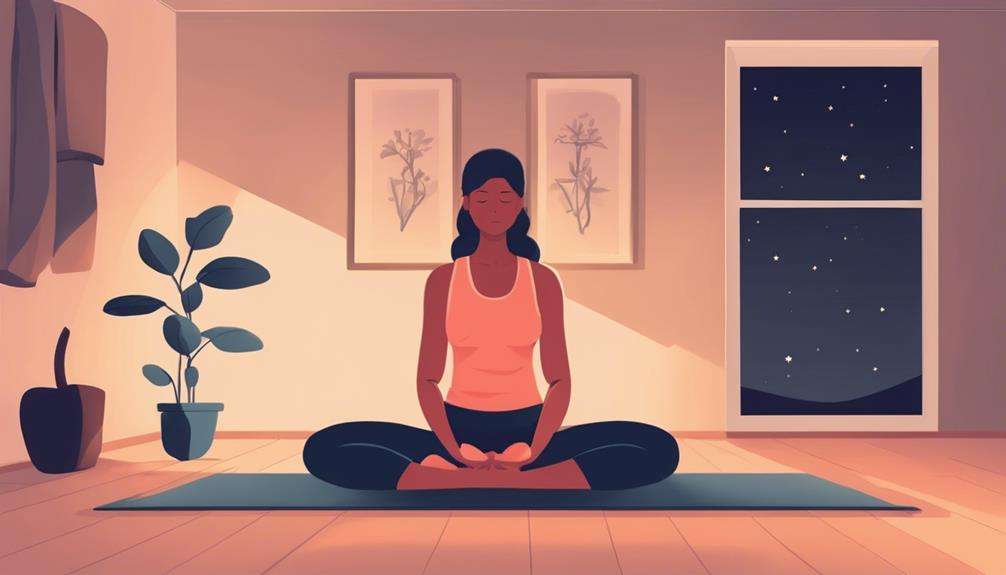
Feeling restless before bedtime? Practicing specific yoga poses can help relax your body and mind, setting the stage for a restful night's sleep. Here are five key points to consider when incorporating yoga into your evening routine:
- Mind-Body Connection: Yoga promotes a strong connection between your physical body and mental state, allowing you to release tension and prepare for sleep.
- Deep Breathing: Through yoga practice, you engage in deep, intentional breathing, which calms the nervous system and signals relaxation to your body.
- Relaxation Techniques: Yoga poses like Child's Pose and Corpse Pose encourage muscle relaxation, easing you into a peaceful state before bed.
- Evening Ritual: Establishing a short yoga routine as part of your evening ritual can signal to your mind and body that it's time to unwind and prepare for rest.
- Stress Reduction: By reducing stress levels through yoga practice, you pave the way for improved sleep patterns, overall well-being, and a rejuvenated mind in the morning.
Breathing Exercises for Better Sleep
To improve your sleep quality, incorporating breathing exercises into your bedtime routine can effectively calm your mind and body, promoting relaxation for a restful night's sleep. Deep breathing exercises are a simple yet powerful tool that can help signal your body to unwind and prepare for sleep.
Research indicates that these techniques can lower cortisol levels, the stress hormone that often interferes with a good night's rest. By regularly practicing deep breathing before bed, you can reduce the time it takes to fall asleep and enhance the overall efficiency of your sleep.
These exercises work by shifting your body into a parasympathetic state, ideal for relaxation and sleep. Deep breathing is a medical and scientifically proven method to improve your sleep quality, making it an accessible and valuable addition to your sleep meditation routine.
Creating a Bedtime Meditation Routine

Ready to enhance your sleep routine and drift off more peacefully?
Let's talk about mindful breathing before bed, a relaxing body scan, and visualizing peaceful sleep.
These simple bedtime meditation practices can help calm your mind and signal your body that it's time to rest.
Mindful Breathing Before Bed
Establishing a consistent bedtime meditation routine that incorporates mindful breathing can significantly enhance your ability to calm the mind and prepare your body for a restful night's sleep. Mindful breathing before bed can help reduce stress, promote relaxation, and improve sleep quality.
Here are some benefits of incorporating mindful breathing into your nightly routine:
- Reduces stress and promotes relaxation
- Signals the body to unwind for sleep
- Lowers heart rate and cortisol levels
- Improves sleep quality and reduces disturbances
- Enhances overall well-being
Relaxing Body Scan
Incorporate a relaxing body scan into your bedtime meditation routine to promote relaxation and prepare your mind and body for a restful night's sleep. Body scan meditation, a form of mindfulness meditation, involves sequentially focusing on different body parts to improve sleep quality. This practice helps release tension, inducing calmness and awareness.
By systematically scanning and relaxing each body part, you can alleviate physical discomfort and mental stress, reducing pre-sleep arousal. Research supports body scan meditation for better sleep by promoting mindfulness. Including this practice in your bedtime routine aids in unwinding, quieting the mind, and preparing your body for a peaceful night's rest.
Embrace the soothing benefits of body scan meditation to enhance relaxation and promote better sleep.
Visualizing Peaceful Sleep
To enhance your bedtime routine for better sleep, consider visualizing a peaceful sleep environment through meditation. Mindfulness meditation helps improve your sleep by relaxing your body and mind before bed. When you engage in guided meditation focusing on visualization, you can create a serene mental space that prepares you for a restful night.
Frequently Asked Questions
Can Meditation Improve Sleep Quality?
Meditation benefits your sleep by promoting relaxation, reducing stress, and improving mindfulness practices. It can help with sleep disorders, insomnia relief, and establishing healthy sleep habits. Embrace these techniques for better rest tonight.
Can Meditation Be as Restful as Sleep?
You'll be surprised to learn that meditation can indeed be as restful as sleep. By practicing sleep meditation, relaxation techniques, and mindfulness practices like deep breathing, you can enhance sleep quality, experience restful meditation, and find stress relief.
How Can I Use Meditation to Sleep Better?
To use meditation for better sleep, focus on deep breathing, mindful relaxation, guided visualization, body scan, sleep meditation, progressive relaxation, a soothing nighttime routine, and stress reduction. Embrace these techniques to enhance your rest and well-being.
Can Meditation Fix Sleep Deprivation?
You're wondering if meditation can fix sleep deprivation. The benefits of meditation, like mindful relaxation and deep breathing, can indeed help improve sleep patterns, provide insomnia relief, and lead to restful sleep. Give it a try!
Conclusion
So, next time you're tossing and turning in bed, why not give meditation a try?
It's not just a new age fad – research shows it can actually help you get better sleep.
By calming your mind, relaxing your body, and focusing on the present moment, you might just find yourself drifting off to dreamland faster than ever before.
Sweet dreams!

